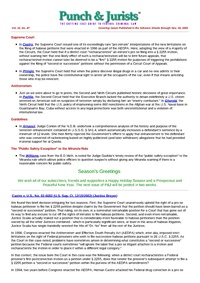In this search and seizure case, the Supreme Court held that the police had constitutional authority to arrest all three occupants of a car they had stopped for speeding, after a search found five bags of crack cocaine and $763 in cash, for which none of the three men …
Here the Court held that if a district court “recharacterizes” an inmate’s pro se filing into a § 2255 motion, without warning him that one likely effect of such a recharacterization will be to limit future appeals, it cannot be deemed a "first" § 2255.
This is an …
Here, a divided panel upheld a constitutional challenge to a portion of the Controlled Substances Act of 1970 (21 U.S.C. §§ 802(6) and 812(a)), holding that patients who take marijuana pursuant to a doctor’s recommendation cannot be prosecuted under that law in states like California that have approved medical …
In this case, firmly stating that district courts “possess the discretion to avoid wreaking extraordinary destruction on dependents who rely on the defendant for their care,” Judge Adelman granted a two-level downward departure based on extraordinary family circumstances under U.S.S.G. § 5H1.6 to a defendant, whose elderly and infirm …
Here, in an issue of first impression, the Court concluded that the Sentencing Guidelines permit a sentence of community confinement longer than six months when that confinement is “reasonably related” to the “nature and circumstances of the offense and the history ad characteristics of the defendant.” Although Application Note …
Here the Court refused to apply a terrorism enhancement pursuant to the provisions of U.S.S.G. § 3A1.4, because the defendant was neither convicted of a terrorism offense nor accued of participating in any act of terrorism.
As has happened to many terrorist suspects, the defendant in this case, …
[Case Summary Below is Reprinted From the Texas Lawyer, December 18, 2003]
5th Circuit: Malicious Prosecution Not a Constitutional Violation
John Council
Texas Lawyer
12-18-2003
In an important civil rights decision, the 5th U.S. Circuit Court of Appeals ruled last week that a "malicious prosecution" claim, standing alone, does …
Here the Court granted a permanent injunction barring the Orange County Correctional Facility from implementing its policy that called for the automatic strip searches of all newly-admitted detainees arrested on suspicion of a felony.
Plaintiff class of pretrial detainees sued defendant county and sheriff under 42 U.S.C.S. § …
This is an important decision under the Prison Litigation Reform Act (PLRA), in which the Second Circuit called for greater scrutiny of claims that a prisoner had failed to exhaust his administrative remedies - a finding that would require dismissal of the lawsuit under the provisions of the PLRA, …
This case is noted for Judge Gadola’s timely review of the “public safety exception” to the Miranda rule which allows police officers to question suspects without giving any Miranda warning if there is a reasonable concern for public safety.
Four years ago, the Fourth Circuit joined a rapidly …
This decision is noted for its detailed discussion of the “state of mind” exception to the hearsay rule. The defendant, Jay Lentz, was charged with the kidnapping and death of his former wife, Dorris Lentz, who mysteriously disappeared on the eve of her divorce proceedings against Jay. The Government …
